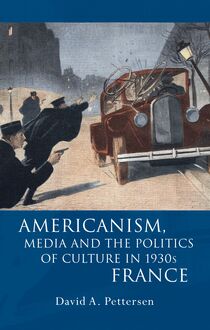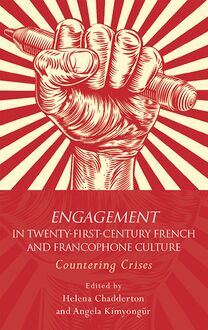French Muslims , livre ebook
126
pages
English
Ebooks
2010
Vous pourrez modifier la taille du texte de cet ouvrage
Obtenez un accès à la bibliothèque pour le consulter en ligne En savoir plus
Découvre YouScribe en t'inscrivant gratuitement
Découvre YouScribe en t'inscrivant gratuitement
126
pages
English
Ebooks
2010
Vous pourrez modifier la taille du texte de cet ouvrage
Obtenez un accès à la bibliothèque pour le consulter en ligne En savoir plus
Publié par
Date de parution
01 août 2010
Nombre de lectures
0
EAN13
9781783165971
Langue
English
Publié par
Date de parution
01 août 2010
Nombre de lectures
0
EAN13
9781783165971
Langue
English
FRENCH AND FRANCOPHONE STUDIES
French Muslims
Series Editors
Hanna Diamond (University of Bath)
Claire Gorrara (Cardiff University)
Editorial Board
Ronan le Coadic (Université Rennes 2)
Nicola Cooper (Swansea University)
Didier Francfort (Université Nancy 2)
Sharif Gemie (University of Glamorgan)
H. R. Kedward (Sussex University)
Margaret A. Majumdar (University of Portsmouth)
Nicholas Parsons (Cardiff University)
Max Silverman (University of Leeds)
French Muslims
New Voices in Contemporary France
Sharif Gemie
© Sharif Gemie, 2010
All rights reserved. No part of this book may be reproduced in any material form (including photocopying or storing it in any medium by electronic means and whether or not transiently or incidentally to some other use of this publication) without the written permission of the copyright owner except in accordance with the provisions of the Copyright, Designs and Patents Act 1988 or under the terms of a licence issued by the Copyright Licensing Agency Ltd, Saffron House, 6–10 Kirby Street, London, EC1N 8TS. Applications for the copyright owner’s written permission to reproduce any part of this publication should be addressed to the University of Wales Press, 10 Columbus Walk, Brigantine Place, Cardiff, CF10 4UP.
www.uwp.co.uk
British Library Cataloguing-in-Publication Data
A catalogue record for this book is available from the British Library.
ISBN: 9780708323205
e-ISBN 978-1-78316-597-1
The right of Sharif Gemie to be identified as author of this work has been asserted by him in accordance with sections 77, 78 and 79 of the Copyright, Designs and Patents Act 1988.
The publisher has no responsibility for the persistence or accuracy of URLs for any external or third-party internet websites referred to in this book, and does not guarantee that any content on such websites is, or will remain, accurate or appropriate.
Cover image: Clifford Hayes.
Contents
__________________
Series Editors’ Preface
Acknowledgements
Glossary
Introduction: at the Funeral
Chapter One: The War of Symbols: a Chronicle of a Debate Foretold
Chapter Two: Chahdortt Djavann: Assimilation as Liberation
Chapter Three: Fadela Amara: Assimilation as Social Reform
Chapter Four: Organizations and Institutions
Chapter Five: Tariq Ramadan: an Islamic Liberation Theology
Chapter Six: Houria Bouteldja: a Native in the Republic
Conclusion: After the Funeral
Epilogue
Notes
Select Bibliography
Series Editors’ Preface
__________________
This series showcases the work of new and established scholars working within the fields of French and francophone studies. It publishes introductory texts aimed at a student readership, as well as research-orientated monographs at the cutting edge of their discipline area. The series aims to highlight shifting patterns of research in French and francophone studies, to re-evaluate traditional representations of French and francophone identities and to encourage the exchange of ideas and perspectives across a wide range of discipline areas. The emphasis throughout the series will be on the ways in which French and francophone communities across the world are evolving into the twenty-first century.
Hanna Diamond and Claire Gorrara
Acknowledgements
__________________
This is my fifth book. It would be nice to say that I find that they’re getting easier; this has not been the case, and this work in particular has led me to analyse some new and difficult issues. However, I have truly enjoyed writing this book, and I hope that alongside the polemics and political passion that this book considers, this work will inspire readers to share my interest in these topics.
At various points I have called on friends and colleagues to help, advise, guide and even warn me about my many draft versions of this book. In no particular order, I’d like to thank, Paul Chambers, Ruth Kinna, Anthony Fiscella, Penny Richards, Brian Ireland, Laure Humbert, Gavin Edwards, Chris Meredith, Tom Cahill, Ali Wardak, Mona al- Honi and Louise Rees for assistance with particular awkward points; Sarah Lewis, the commissioning editor for University of Wales Press, for her encouragement and, in particular, for her invaluable assistance during a difficult moment in January 2008. And also Patricia Clark, for so much.
Glossary
__________________
CCMTF
Comité de coordination des musulmans turcs de France: Coordinating Committee of Turkish Muslims of France.
CFCM
Conseil français du Culte Musulman: French Council of the Muslim Faith. See chapter four .
CFDT
Confédération Française Démocratique du Travail: Democratic French Confederation of Labour. Created in 1964, it is now the largest trade union federation in France. Normally seen as moderate left.
CGT
Confédération générale du travail: General Confederation of Labour, created in 1895. The second largest trade union confederation in France, normally seen as left-wing.
CRCM
Conseil Regional du Culte Musulman: Regional Council of the Muslim Faith. There are twenty-five regional councils, all forming part of the CFCM.
EPT
Une école pour tou-te-s: A School for Everyone (with the French title specifying all girls and all boys). Organization formed to protest against the proposed law on religious symbols in schools in February 2004. See chapters four and six .
FNMF
Fédération Nationale des Musulmans de France: National Federation of Muslims of France, Moroccan linked Muslim organization, created in 1985 in opposition to the grande mosquée .
FSU
Fédération syndicale unitaire: United Syndical Federation. Founded in 1993, the FSU is the largest union of secondary school teachers.
LDH
Full title: Ligue française pour la défense des droits de l’homme et du citoyen, normally shortened to Ligue des Droits de l’homme: League of the Rights of Man. Founded in 1898, during the Dreyfus Affair, and dedicated to the defence of Human Rights. Often seen as a left-of-centre organization.
MIR
Mouvement des Indigènes de la République: Movement of the Natives of the Republic. Radical, anti-colonialist movement, created in 2004. See chapter six .
MRAP
Mouvement contre le racisme et pour l’amitié entre les peuples: Movement against Racism and for Friendship between Peoples, created in 1949. Left-wing anti-racist organization.
UOIF
Union des Organisation Islamiques de France: Union of Islamic Organizations of France, founded in 1983. See chapter four .
‘We don’t need people like you!’
‘And do you think that I need you?’
‘No, no, no. You and your veil, you can go back home!’
‘But this is my home.’
‘Your home? You’ll never be at home here!’
‘Is that so? What makes you more French than me?’
‘The veil, it’s not French! This is a Republic! Watch out! I’ve warned you!’
Street confrontation, Lille, c .2006–7 1
Introduction
At the Funeral
__________________
We loved you so much.
Houria Bouteldja, 2005 1
There were times when I could not stop myself from admiring Jacques Chirac. As president of the French Republic, he seemed to incarnate the dignity of statesmanship in a manner that left his contemporary, Tony Blair, looking amateurish. One of these moments occurred in September 2003. Readers may remember the extraordinary heatwave which swept across Europe during that summer, stifling dozens of old, frail people in many cities. In Paris, as elsewhere, there were tragic cases in which, days after their death, lonely anonymous corpses were found in cheap apartments, under bridges and in wastelands, the last remains of tramps, alcoholics and down-and-outs. Often no one came forward to claim them, despite the best efforts of the Parisian authorities to identify them and to locate relatives. Finally, in September 2003, a decision was taken to bury these wretched, lost victims, with the municipality arranging the procedures. At that moment, Chirac stepped in. He chose to attend these funerals, for even a dead tramp was a citizen of the Republic. Chirac’s presence embodied a type of trans-political solidarity that transcended social, cultural and political divisions. This incident may have been the last occasion on which the values of French Republicanism were successfully presented as embodying ideals of social inclusion.
There were no cameras at the municipal funeral. Unlike Blair, Chirac understood the power of publicity without photographs: his gesture demonstrated a finely crafted political instinct, rooted in a perceptive evaluation of French people’s sensibility, which eloquently asserted a principle without argument or conflict.
I was therefore amazed at some press reports early in December 2003. Chirac visited Tunis, and spoke to some school students. They raised the question of Muslim schoolgirls wearing veils. Chirac’s response was astonishing. He explained to the Tunisian students that they had to understand that there was ‘something aggressive’ about the veil: wearing one to school raised a question of principle. Chirac referred to the Stasi Commission that was considering this question in the context of a larger study of the nature of laïcité (a term to be explored in the next chapter ). 2 Chirac’s comments on the veil were odd. There seemed to be something almost comic about the idea that the president of France was voicing his concern about aggressive schoolgirls. More seriously, there was also a stark contrast between these values and his previous pronouncements: if an anonymous tramp was recognized as a member of the Republic, shouldn’t this quality also be extended to a veiled Muslim schoolgirl? And yet Chirac, the experienced statesman, chose to express this kind of exclusionary feeling in public, fully aware that his statements would be reported by the world’s press.
Something was changing in France. Chirac’s words presaged a small change in the regulations governing state schools (in effect, in March 2004 veil-wearing schoolgirls were banned) and illustrated a larger change in public attitudes to mi














